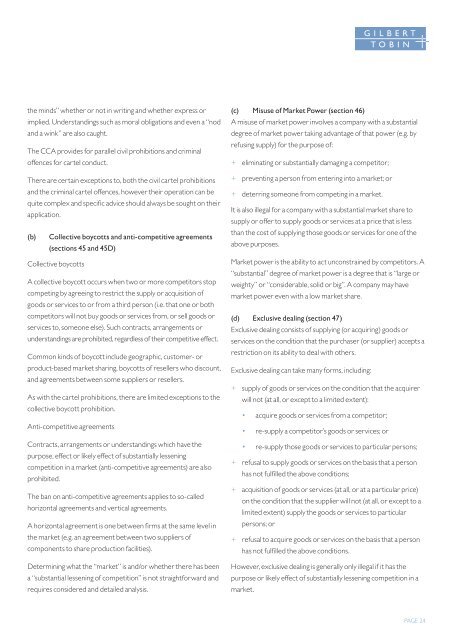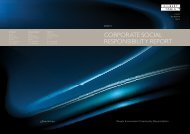Gilbert + tobin - Gilbert and Tobin
Gilbert + tobin - Gilbert and Tobin
Gilbert + tobin - Gilbert and Tobin
Create successful ePaper yourself
Turn your PDF publications into a flip-book with our unique Google optimized e-Paper software.
the minds” whether or not in writing <strong>and</strong> whether express or<br />
implied. Underst<strong>and</strong>ings such as moral obligations <strong>and</strong> even a “nod<br />
<strong>and</strong> a wink” are also caught.<br />
The CCA provides for parallel civil prohibitions <strong>and</strong> criminal<br />
offences for cartel conduct.<br />
There are certain exceptions to, both the civil cartel prohibitions<br />
<strong>and</strong> the criminal cartel offences, however their operation can be<br />
quite complex <strong>and</strong> specific advice should always be sought on their<br />
application.<br />
(b) Collective boycotts <strong>and</strong> anti-competitive agreements<br />
(sections 45 <strong>and</strong> 45D)<br />
Collective boycotts<br />
A collective boycott occurs when two or more competitors stop<br />
competing by agreeing to restrict the supply or acquisition of<br />
goods or services to or from a third person (i.e. that one or both<br />
competitors will not buy goods or services from, or sell goods or<br />
services to, someone else). Such contracts, arrangements or<br />
underst<strong>and</strong>ings are prohibited, regardless of their competitive effect.<br />
Common kinds of boycott include geographic, customer- or<br />
product-based market sharing, boycotts of resellers who discount,<br />
<strong>and</strong> agreements between some suppliers or resellers.<br />
As with the cartel prohibitions, there are limited exceptions to the<br />
collective boycott prohibition.<br />
Anti-competitive agreements<br />
Contracts, arrangements or underst<strong>and</strong>ings which have the<br />
purpose, effect or likely effect of substantially lessening<br />
competition in a market (anti-competitive agreements) are also<br />
prohibited.<br />
The ban on anti-competitive agreements applies to so-called<br />
horizontal agreements <strong>and</strong> vertical agreements.<br />
A horizontal agreement is one between firms at the same level in<br />
the market (e.g. an agreement between two suppliers of<br />
components to share production facilities).<br />
Determining what the “market” is <strong>and</strong>/or whether there has been<br />
a “substantial lessening of competition” is not straightforward <strong>and</strong><br />
requires considered <strong>and</strong> detailed analysis.<br />
(c) Misuse of Market Power (section 46)<br />
A misuse of market power involves a company with a substantial<br />
degree of market power taking advantage of that power (e.g. by<br />
refusing supply) for the purpose of:<br />
+ + eliminating or substantially damaging a competitor;<br />
+ + preventing a person from entering into a market; or<br />
+ + deterring someone from competing in a market.<br />
It is also illegal for a company with a substantial market share to<br />
supply or offer to supply goods or services at a price that is less<br />
than the cost of supplying those goods or services for one of the<br />
above purposes.<br />
Market power is the ability to act unconstrained by competitors. A<br />
“substantial” degree of market power is a degree that is “large or<br />
weighty” or “considerable, solid or big”. A company may have<br />
market power even with a low market share.<br />
(d) Exclusive dealing (section 47)<br />
Exclusive dealing consists of supplying (or acquiring) goods or<br />
services on the condition that the purchaser (or supplier) accepts a<br />
restriction on its ability to deal with others.<br />
Exclusive dealing can take many forms, including:<br />
+ + supply of goods or services on the condition that the acquirer<br />
will not (at all, or except to a limited extent):<br />
••<br />
acquire goods or services from a competitor;<br />
••<br />
re-supply a competitor’s goods or services; or<br />
••<br />
re-supply those goods or services to particular persons;<br />
+ + refusal to supply goods or services on the basis that a person<br />
has not fulfilled the above conditions;<br />
+ + acquisition of goods or services (at all, or at a particular price)<br />
on the condition that the supplier will not (at all, or except to a<br />
limited extent) supply the goods or services to particular<br />
persons; or<br />
+ + refusal to acquire goods or services on the basis that a person<br />
has not fulfilled the above conditions.<br />
However, exclusive dealing is generally only illegal if it has the<br />
purpose or likely effect of substantially lessening competition in a<br />
market.<br />
PAGE 24







